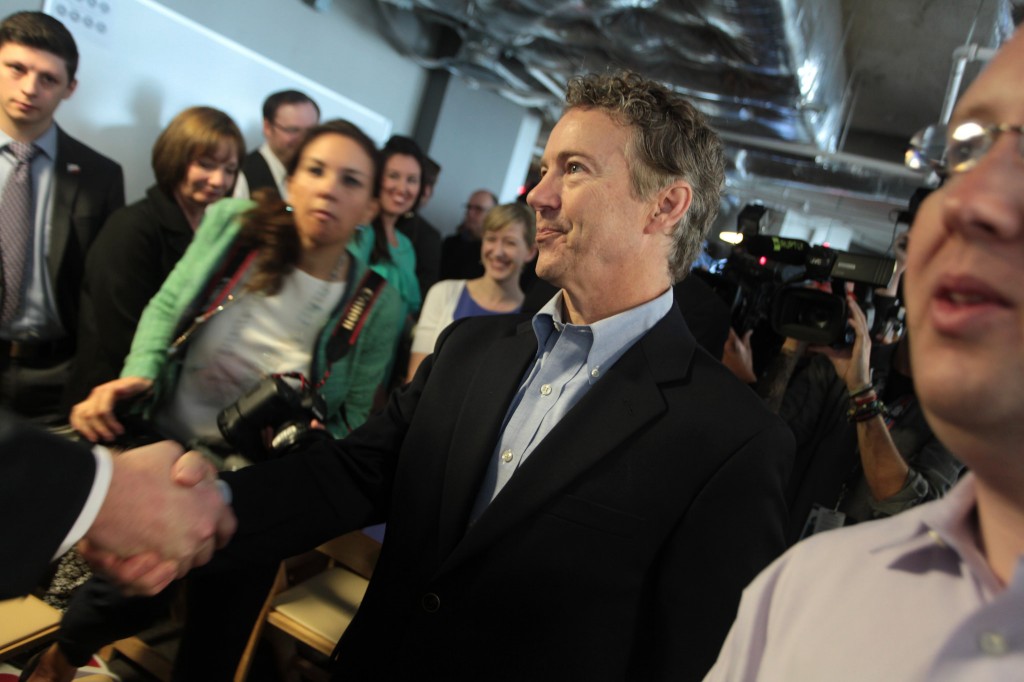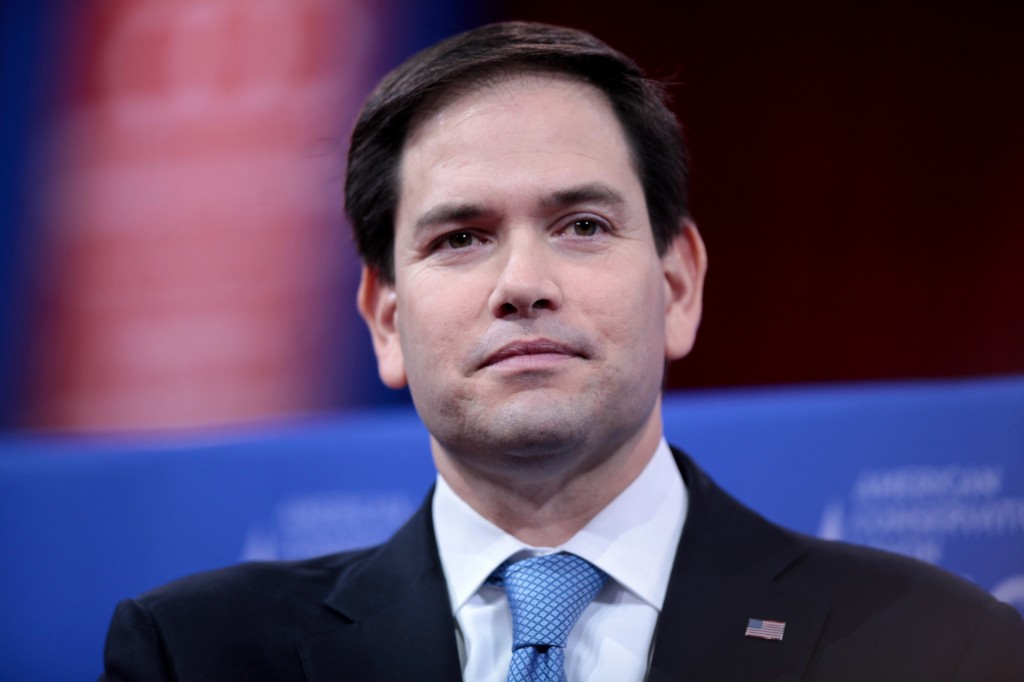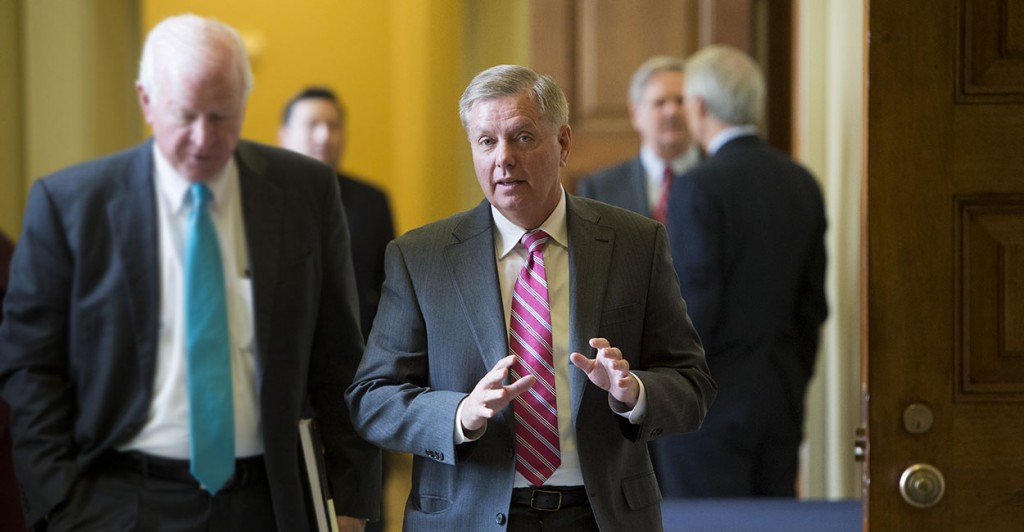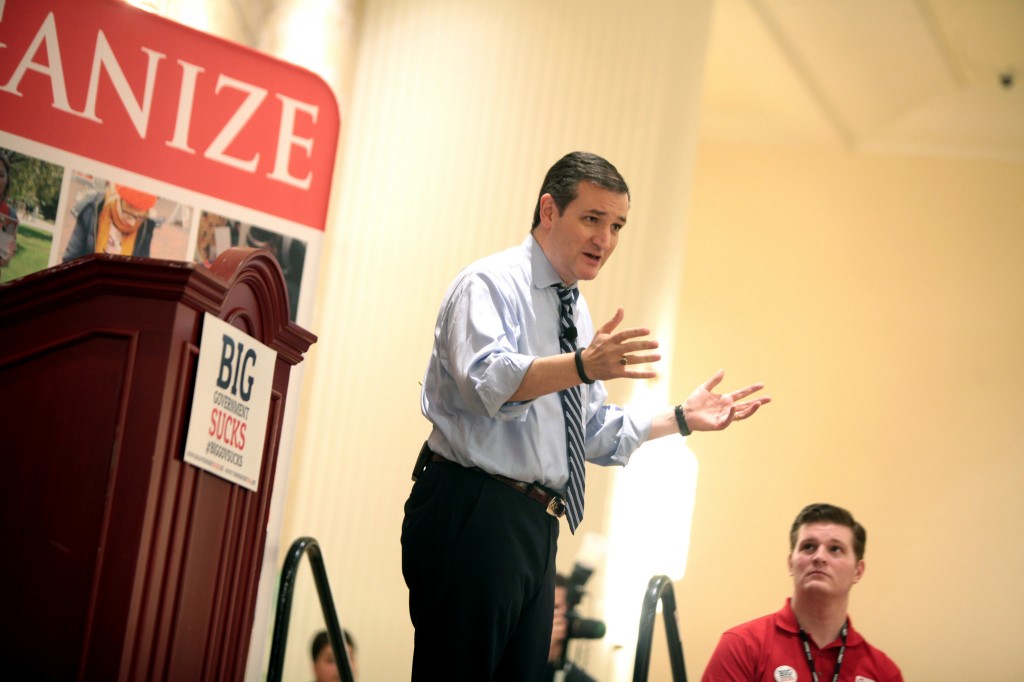The first budget resolution to clear the Senate in four years exposed a divide between four lawmakers who look to be rivals for the Republican nomination for president.
Although largely symbolic and perhaps short-lived, the split had Sens. Lindsey Graham of South Carolina and Marco Rubio of Florida voting in favor of the Republican budget plan around 3 a.m. Friday while Ted Cruz of Texas and Rand Paul of Kentucky voted no.
“I cannot support a budget that claims to balance [with] revenue increases generated by Obamacare taxes,” @SenTedCruz says.
“We need meaningful entitlement reforms, without budget gimmicks, and I cannot support a budget that claims to balance in the year 2025 by utilizing revenue increases generated by Obamacare taxes,” Cruz, the first major Republican or Democrat to announce for president, said in a statement explaining his vote.
Although crediting fellow Republicans for their efforts to mitigate what he called “unrealistic spending increases and continually expanding deficits” under President Obama, Cruz sought to appeal to fiscal conservatives by saying it wasn’t enough “given the gravity of the debt facing our children and grandchildren.”
Paul didn’t explain why he voted against the Republican plan, and his office did not respond to inquiries from The Daily Signal.
On the Senate floor earlier, however, Paul argued that he supported increases in military spending but they should be offset by cuts in other programs.
“America does not project power from bankruptcy court,” he said. “We need a strong national defense, but we should be honest with the American people and pay for it.”
Majority Leader Mitch McConnell, a frequent Paul ally as the senior senator from Kentucky, characterized the Senate’s pending budget action as “delivering that change” voters mandated Nov. 4 in returning the upper chamber of Congress to Republican control.

“America does not project power from bankruptcy court,” says Sen. Rand Paul. (Photo: Gage Skidmore/CC BY-SA 2.0)
But without Cruz and Paul, McConnell couldn’t afford to lose two more votes and still secure adoption of the GOP’s spending priorities for next year.
“The safe vote for Rand Paul and Ted Cruz was to vote no,” Steve Moore, an economist and distinguished visiting fellow at The Heritage Foundation, told The Daily Signal. “They are trying to get to the fiscal right of each other.”
The political theater included Democrat Elizabeth Warren of Massachusetts and independent Bernie Sanders of Vermont, two possible contenders for the Democratic presidential nomination should Hillary Rodham Clinton’s campaign falter.
“The Republican budget resolution we’ll vote on tonight would weaken the rules on Wall Street and raises the risk of another financial crisis – all so the big banks can rake in more money,” Warren said in a Facebook post Thursday.
“The Republican budget resolution … raises the risk of another financial crisis,” @SenWarren says.
Cruz formally announced his candidacy for the GOP nomination for president last Monday. That left three other potential 2016ers among fellow Republican senators. Paul has set an announcement for April 7 in Louisville, Ky., followed by rallies in the first four primary or caucus states. Rubio and Graham have yet to divulge plans, although the Tampa Bay Times reported Rubio is set to announce April 13 in Miami.
The “nays” from Cruz and Paul in the 52-46 vote on the budget resolution injected some last-minute drama into what for veteran observers was a fairly predictable, 16-hour marathon dubbed a “vote-a-rama.”
With next year’s contests for the Senate as well as the White House in mind, Republicans and Democrats sought to push each other into tight spots in a series of votes on more than 50 non-binding amendments on topics ranging from more military spending to covering student loans.
“I am disappointed the budget didn’t fully prioritize our national security.”–@marcorubio
It was a partisan duel of messages aimed at political activists. Competing and ultimately doomed plans from Paul and Rubio to increase the defense budget—Paul’s specifying “offsets” from other spending priorities, Rubio’s without—came the closest to a head-to-head clash of Republican White House hopefuls.
After Republicans passed their plan, without help from a single Democrat and including a $38 billion, off-budget increase in defense spending, Rubio said:
I am disappointed the budget didn’t fully prioritize our national security needs and take even bolder steps to undo the damage President Obama’s disastrous policies and defense cuts have wrought on our military and intelligence capabilities. But I will continue fighting to prioritize our national defense.
On Friday, Warren posted this on a second Facebook account:
The biggest banks on Wall Street have made it clear that they expect a return on their investment in Washington. They…
Posted by Elizabeth Warren on Friday, March 27, 2015
Warren and Sanders, the ranking member of the Budget Committee, joined all other voting Democrats in opposing the Republican plan. (California’s Dianne Feinstein and Maryland’s Barbara Mikulski did not vote.)
“As policymakers from both sides of the aisles are trying to come together to solve Social Security’s more than $13 trillion unfunded obligation, Warren and Sanders positioned themselves on the far left with calls for more generous Social Security benefits,” Romina Boccia, The Heritage Foundation’s Grover M. Hermann research fellow in federal budgetary affairs, told The Daily Signal. “Never mind what this will cost younger, working generations in direct pay and economic opportunity.”
Rubio teamed with newly elected Republican Tom Cotton of Arkansas for an amendment to increase defense spending next year by $78 billion, to $697 billion.
When we cut defense spending, we think we are saving money, but in the long run, we end up paying more and creating more risk and uncertainty.
Posted by Marco Rubio on Thursday, March 26, 2015
“The national security of our country is … the one thing that only the federal government can do,” Rubio said in a floor speech, “and it is the first thing that it is tasked with doing.”
The amendment was defeated, 32 to 68. Cruz and Graham supported Rubio, but Claire McCaskill of Missouri was the only Democrat to do so. Paul and nearly two dozen other Republicans voted no.
Paul proposed to increase defense spending by $190 billion over two years, paying for it with cuts in education, science, natural resources and foreign aid programs. Paul’s amendment went down harder, 4-96, even after—in a direct shot at Rubio—he denounced any move to bolster the military without offsets elsewhere as “irresponsible” and “dangerous.”
“National defense is the number one priority of the federal government,” Paul said in a floor speech echoing recent stump speeches designed to raise his profile on national security. “My amendment increases defense spending but pays for it with spending cuts. It is irresponsible and dangerous to continue to put America further into debt, even for something we need.”
“It is irresponsible and dangerous to continue to put America further into debt, even for something we need.”–@SenRandPaul
In this particular battle between defense hawks and fiscal hawks, however, Paul managed to lure only three Republicans to support him: McConnell, Budget Chairman Mike Enzi of Wyoming and David Vitter of Louisiana.
Although the final Senate resolution would raise defense spending by $38 billion, it gets around caps set in 2011 by upping to $96 billion the off-budget accounts originally created for the wars in Afghanistan and Iraq.
“Passage of this provision will be welcome news to those charged with protecting our nation,” @LindseyGrahamSC says.
Who championed that approach? Graham, a defense hawk who was among those voting the budget resolution out of committee.
Calling the defense increase “one of my proudest accomplishments” because it will contribute to the fight against the ISIS terrorist group, Graham added:
Today, there are more terrorist organizations with more capabilities, more arms, more recruits and more safe havens to attack the United States than any time before 9/11. I believe the passage of this provision will be welcome news to those charged with protecting our nation.
Each of the White House hopefuls used the process to signal priorities in the months ahead. Rubio, for instance, called for deficit-neutral reserves in anticipation of a welfare reform package, tax credits for low- and middle-income students to attend private schools, and a universal tax credit for higher education.

Sen. Marco Rubio, R-Fla., clashed with Sen. Rand Paul, R-Ky., on defense spending. (Photo: Gage Skidmore/CC BY-SA 2.0)
Beginning Thursday afternoon and continuing until the wee hours Friday, 56 out of nearly 800 such non-binding amendments came to a vote or otherwise were dispensed with.
Sanders, a socialist who caucuses with the Democrats, called the final budget plan a “rich-get-richer approach,” arguing Friday in a lengthy statement:
The reality is that the American middle class has been shrinking steadily and there is nothing in here to address that. You can see that at a time of massive income inequality, the Republicans believe that a rich-get-richer approach fits best. At a time when real unemployment is more than 11 percent, Republicans believe that we should do nothing to create jobs or invest in infrastructure.
Of the six potential presidential candidates, Sanders had the greatest number of non-binding amendments—six—that got addressed.
“The Republicans believe that a rich-get-richer approach fits best.”—@SenSanders
Three successful “markers” from Sanders were to prevent cuts to Medicaid beneficiaries (passed, 94-3); to hire “health professionals” and improve infrastructure at Veterans Affairs hospitals (passed by voice vote); and to put a moratorium on closing postal processing plants (passed by voice vote). His three defeated ones were to reduce emissions to fight “climate change” (49-50), to increase the minimum wage by a “substantial” amount (48-52) and to raise taxes to pay for infrastructure projects (45-52).
Posted by Bernie Sanders on Thursday, March 26, 2015
Warren’s marker to raise taxes to refinance student loans failed, 46-53.
Graham withdrew an amendment to subject all federal spending except Social Security to the automatic budget cuts known as sequestration.
None of Cruz’s 10 amendments was taken up.
When time ran out, the five other White House hopefuls also had at least one amendment awaiting action: Rubio with 24, Graham five, Paul five, Sanders five and Warren one.

Sen. Lindsey Graham, R-S.C., called the boost in defense spending “one of my proudest accomplishments.” (Photo: Bill Clark/Newscom)
Other highlights from the “vote-a-rama” saw presidential prospects in play amid the greater partisan picture.
In these votes on typical amendments, the four Republican senators with presidential aspirations stuck together on the prevailing side of the messaging, while Warren and Sanders were in the minority:
- Restrict the First Amendment rights of private, nonprofit corporations to participate in the political process. Defeated, 47-52.
- Prohibit withholding of highway funds from states that refuse to submit “implementation plans” to the Environmental Protection Agency, as required by its regulation of greenhouse gas emissions. Passed, 57-43.
- Eliminate the federal estate tax, also called the “death tax.” Passed, 54-46.
- Require the federal government to allow states, without penalty, to opt out of Common Core education standards. Passed, 54-46.
- Block a federal tax on carbon emissions. Passed, 58-42.
- Expedite state and local governments’ ability to acquire federal land that isn’t within a national park, preserve or monument. Passed, 51-49.
- Deter migration of unaccompanied children to the U.S. from El Salvador, Guatemala and Honduras. Passed, 58-42.
“The Democrat-led Senate for years refused not only to pass a balanced budget, but any budget at all,” McConnell said in a statement released after the final vote. “Those days are over, and the proof is passage of a balanced plan with ideas that Congress’ nonpartisan analysts tell us would boost jobs, raise income and drive economic growth.”
“The Democrat-led Senate for years refused not only to pass a balanced budget, but any budget at all,” @Team_Mitch says.
If the spending plan relies on revenue from Obamacare taxes, it also sets up a process for Republican majorities in the House and Senate to vote to repeal the health care law. Cruz, Paul and Rubio are united on that goal, while Graham wants to retain some of it. Regardless, the votes currently aren’t there to override the president’s certain veto.
The Senate’s blueprint would balance the budget in 10 years, trimming $5.1 trillion along the way—including $430 billion in unspecified cuts from Medicare—without raising taxes. The House plan from Enzi’s counterpart, Republican Tom Price of Georgia, reaches balance in nine years by cutting $5.5 trillion.
The White House later Friday morning sought to marginalize the Senate budget as leaning on “gimmicks” and unfairly penalizing the middle class, seniors and children to reduce the deficit.
Next, the Senate and House must agree on a spending plan. The House, with 17 Republicans voting no, passed its budget plan Wednesday. House and Senate conferees face an April 15 deadline to agree on a final package.
Note: This report was updated and modified.





























